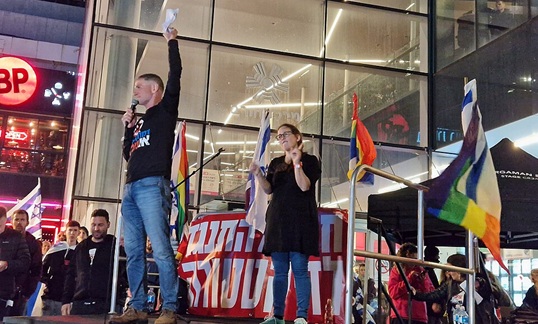In an interview with Makor Rishon, former Israeli Supreme Court President Aharon Barak told new versions of stories in which he featured; the problem is, the are contrary to known facts and evidence. The Judicial Revolution is now rewriting its own history

The interview granted by former Supreme Court President Prof. Aharon Barak to Michael Tuchfeld of Makor Rishon may seem boring and routine, but it has a dramatic element. Barak doesn't give interviews often, and maybe because of this, alongside the normal judicial slogans, he unwittingly reveals more than a bit of his outlook on legal news, people, and proper governance.
Let me say from the outset: what he says is worrying. Almost all the factual assertions that Barak makes as a matter of course do not pass scrutiny, and in some cases even explicitly contradict things he himself did or publicly said. Barak is creating an alternate version of history in the interview, which sweeps the ugly campaign of deception, politics, arm-twisting, and censorship involved in his constitutional revolution under the rug.
I will note seven examples of this in the present article.
1. The Quality of Judges in America
In context of the discussion of judicial appointments, Barak explained that the American system of judicial appointments—wherein the President and Congress appoint the Supreme Court justices—has many flaws that harm the quality of the court. "In this manner, jurists who are head and shoulders above others are prevented from being appointed to the Supreme Court," he said, explaining that "it would be a disaster for the State of Israel if we follow the Americans."
Here we have to wonder about this argument's connection to reality. What exactly is Barak talking about? Is the American Supreme Court really stacked with mediocre jurists? Are there no judges there who are "head and shoulders above the rest"? A look at the present makeup of the American Supreme Court shows they are all graduates of Ivy League universities, some served as professors of law at Harvard and Chicago University, edited journals, published books, and were involved in a variety of legal occupations.
They all got their jobs through a purely political process. If anything, the American experience is a wonderful demonstration that public representatives who take responsibility for economic policy, military command, and foreign policy can also succeed at appointing judges.
Barak's response:
The American system of appointments is bad. It prevents excellent jurists from having a chance to be appointed.
If we're already dealing with judicial appointments, another myth Barak and his camp spread around is that the Israeli system of appointments—which has no parallel anywhere in the world—is considered the best in the world. Barak explained that the "European legal systems are dissatisfied with the political nature of judicial appointments to the constitutional courts," and therefore "many look at our system with envy." But no evidence is presented to back this up.
Prof. Gideon Sapir, in his book The Constitutional Revolution in Israel: Past, Present, and Future (Hebrew), traced the source of this myth and discovered an amusing anecdote: the Zamir Commission report, which dealt with judicial appointments, states based on nothing but conventionally-held clichés that the Israeli system is “highly esteemed outside of Israel" and "is one of the judicial appointments systems in the world."
What's the evidence? A reference to a book written by one of the Commission's members, Prof. Amnon Rubenstein, in which the statement is presented without evidence in earlier editions, and in later ones—cites the Zamir Commission itself. In other words, the Israeli system of appointments is the best in the world because that's the opinion of Israeli judges who think it's the best in the world. QED.
2. Why Wasn’t Ruth Gavison Appointed to the Supreme Court?
In 2005, Ruth Gavison, a renowned jurist, was put forward a candidate for the Supreme Court. Gavison, who opposed Barak's judicial revolution and even published a number of articles against it in academic and other venues, was considered a threat to the trend Barak led, and therefore he and his camp strongly opposed her appointment.
During this stormy period, Barak explained that "She has an agenda, and therefore I oppose the appointment. This agenda is unsuitable for and unbecoming of the Supreme Court." Barak explained: "If Ruth had not expressed her opinion regarding the role of the Supreme Court, I would not have inquired into her opinions, and I would have agreed to her appointment." In other words, the opposition to her appointment derived from her conservative views. That's how commentators and authors have understood his statements from then until now.
But today Barak tells a different story. Pay attention:
When I said 'agenda,' I was not referring to her opinions. At that time, Gavison had a column in a large newspaper, in which she repeatedly attacked the Supreme Court on a long list of issues.
What I said is that one who fights in the public arena for his opinions, in order to bring them to fruition, cannot go straight from being a publicist and activist to being a judge. I never had a problem with the academic criticism Prof. Gavison had…. As far as I'm concerned, if she had abandoned her public activity and maintained her silence for a while, I would have had no problem accepting her to the Supreme Court.
This is the new version: it's not Gavison's opinions that were the problem, and not even the fact that she raised them on academic platforms. The problem was her publicity-generating activity. Writing a column in a "large newspaper." And the solution, according to the latest revisionism, was not preventing the appointment, but a cooling-off period.
Interesting, but this new version has some factual errors. As Gavison posted on her Facebook page, no-one ever offered her the option of a cooling-off period. "I, too, like the interviewer, do not remember this being said then,” she wrote, adding: "I don't remember … that anyone advised me to 'cool down' (not that I would necessarily agree). I know that memory is sometimes fickle."
But to cool off from what? What is that "column in a large newspaper"? Barak alone has the answers. Gavison wrote cynically: "I don't remember having a newspaper column." And indeed, a check of the Beit Ariella newspaper archive shows only 15 articles of hers in the decade prior to the attempted appointment, and only a small portion of these had to do with the role of the Supreme Court. A similar picture emerges on Gavison's own website. Not only did she not have a newspaper column, but in fact, from 2003 to 2005, the years leading up to the nomination, there was a discernable slowdown in the number of her columns and her engagement with the affairs of the Supreme Court. Arguably, she had indeed "abandoned her public activity and maintained her silence for a certain period."
Barak's response:
Neither of us is young, and memory may betray us. To the best of my memory and awareness, things were as I said in the article. I did the same thing in similar cases. I have a stance on public intellectuals: they are great, but I don't believe they can go straight to the bench. This is unquestionably a heavy price, but it's worth paying.
3. The Appointment of Edmund Levi
As part of the effort to pretty up the politics of the legal system, Barak invests much effort in creating a description of its professionalism and impartiality. In this context, he addresses that claim that judges are appointed by the "bring a buddy system," and argues that he tended to "fight" for the appointment of judges he disagreed with. As an example, he mentions Justice Edmund Levy:
It's not like that at all. And I'm happy to have an opportunity to correct that. Are Edmund Levy and Justice Grunis my buddies? I never visited either of them at home, nor did they visit mine. I thought that they were excellent jurists and I fought to bring them in, and when they were brought in—they were brothers to me.
Later in the interview, he expands on this:
I—along with then-Justice Minister Meir Sheetrit—was the one who acted to bring Edmund Levy to the Supreme Court…. I knew his political views, as before he became a judge he was a deputy mayor for the Likud. It didn't bother me at all.
Except that according to revelations at the time, the truth is entirely different: Barak strongly opposed Levy's appointment, which only went through thanks to the efforts of Justice Minister Sheetrit, who made a deal under which Ayala Procaccia, who was close to Barak, was appointed in exchange for Levy also becoming a Supreme Court justice.
This is what Daniel Friedmann wrote in his book The Purse and the Sword (p. 186 of the Hebrew edition), and it is corroborated by confidential source involved in the affair who was in constant contact with Adv. Shmuel Samuel, who passed away last month, and who was the representative on the Judicial Selection Committee who pushed for Levy.
Barak's response:
The articles at the time were wrong. There was no deal.
4. Who Established the Ombudsman’s Office of the Israeli Judiciary?
As part of Barak's whitewashing efforts, he tried to portray the court as open to, and even welcoming of, public criticism:
Criticism is more vital for the court than for any other body. Judges need criticism, as there is no court to judge the judges. That's why the judges are the ones who initiated the establishment of the judiciary’s ombudsman’s office.
Thus, per Barak, out of good will and a genuine concern for transparency and pluralism, the judges themselves initiated the establishment of an ombudsman’s office for the judiciary.
Once again, this isn't true. The man who initiated the establishment of the office was Shinui party MK Yosef Paritzky in 2000. When Paritzky heard what Barak said, he was outraged:
It was my idea to establish the ombudsman’s office. I initiated the program, and I submitted private legislation on the matter. The person who was really supportive was actually the previous [Supreme Court] President, Meir Shamgar, who wrote me a letter about it. Aharon Barak didn't state an opinion. Mishael Cheshin met with me and stridently opposed the idea of such a law.
Not only did judges not initiate the idea of an ombudsman’s office, they opposed it and conducted a campaign against it. According to Paritzky, Barak wasn't part of it, but others remember his opposition behind the scenes very well. For instance, Daniel Friedmann wrote in The Purse and the Sword: "Barak strongly opposed the establishment of such an institution, and supreme court justices turned to MKs and the media to try and prevent the law from advancing." A source who was active in those years as the Israel Bar Association's representative in the Knesset also remembers matters this way: "Barak, Beinisch, and the whole gang opposed and campaigned against the law, circulating around in the Knesset and pressuring MKs."
The judges' pressure was so effective that at a certain stage Paritzky even considered giving up entirely. Aharon Barak and other Supreme Court justices did everything they could to prevent public criticism, including engaging in political activity behind the scenes and using of media. Only after the elected representatives forced their hand did they accept the verdict.
In his response, Barak describes a different chain of events, but also admits that the judges were massively involved in the legislative process on the matter, in contrast to accepted norms in the Western world:
The idea of a judiciary ombudsman was ours. It was first raised by Judge Lindenstrauss, who was the District Court President and a member of the Judicial Selection Committee. We prepared a proposal according to which it would be anchored in internal processes, and in light of accumulated experience, we could formulate the legislation. Our activity became known to MK Paritzky, and he drafted legislation accordingly, while we believed we should tread a more careful path. We tried to convince him, but without success. More to the point, throughout the Knesset proceedings, we supported the proposal.
5. What was the State's Response to the Supreme Court's "Neighbor Procedure" Decision?
In the interview, Barak rejects claims that the Supreme Court's decisions pertaining to the war against terror have endangered national security: "regarding the ‘Neighbor Procedure,’ it was not argued before us that it was meant to protect IDF soldiers. That was not the argument of the state."
The reader wonders, what else could they have argued? Why would the IDF want to use the Neighbor Procedure if not to save lives? In any event, the state's real reply is easy to find. Guess what? Barak is deceiving us again:
In this context, it was emphasized that these are situations where using a Palestinian resident allows the IDF soldiers to avoid carrying out a military operation, whose results might be even greater harm to civilians and soldiers.
Barak, of course, knows this text well, as he quoted it in the relevant ruling:
They emphasized that this use was done in situations where such use would enable them to avoid military action that might harm local residents, soldiers, and property even more.
Barak's response:
I am presently abroad and I do not have the ruling with me. To the best of my memory the argument didn't deal at all with the safety of soldiers.
6. Did Aharon Barak Argue That "All is Justiciable"?
Another myth that Barak tries to shatter is his known claim that "all is justiciable." In the interview, he denies this:
Not everything is justiciable, but the number of non-justiciable matters needs to be small. The exact sentence is 'law in everything, but law is not everything.' There are additional principles of morality and religion, but law takes a position on every human action and establishes if it is permitted or prohibited.
Such statements aren't new. Ever since he retired from the Supreme Court, Barak has tried repeatedly to craft a new narrative around this statement. In 2012, he even said on the Knesset Channel: "I don't think that all is justiciable. I don't think so. I never said it. I don't understand it."
Didn't say? Don't understand? Well, "If you ask me I think all is justiciable," he said in an interview for Haaretz in 2008, where he named a long list of "justiciable" subjects on matters of security and otherwise. Even prior to the interview, in a lecture he gave in 2001: "The law has no limits. The world is filled with law. The law is in all. Every human behavior is subject to a legal norm. There are no areas in life which are outside of law…. The law has no limits."
So how does Barak explain the contradiction here? He tries to disavow the argument that "all is justiciable" by distinguishing between the normative level, at which all is justiciable and the institutional level, where it is not. That is, everything is justiciable in principle, but one need not judge it at the institutional level.
But this is an insult to our intelligence. Because the question is where the line is drawn, and Barak himself does so by saying that if the matters are considered marginal by the judges, then they will forego institutional judgement. As he said in the interview to the Knesset Channel: "a certain norm has been violated, but along with that you come and say: look, it's not so bad." In other words, the judges decide, under the principle of absolute justiciability, what they will judge institutionally. And the obvious significance is that indeed "all is justiciable"! Or to be more precise—"all is justiciable by the Supreme Court."
Barak's response:
There has been no change in my position. "The law is in all" means that the law has a position on every human relation. That is normative justiciability. The question of "all is justiciable" deals with a different issue, and that is institutional justiciability.
7. Did the MKs Who Passed the Basic Laws Know That They Were Creating A Constitutional Revolution?
The main criticism of Aharon Barak has to do with how he led the "judicial revolution." According to him, "[The MKs] understood very well what they were passing…. The idea of judicial review of legislation is common throughout the world, and the Knesset was well aware of this." Later in the interview, he states: "It was not I who started the constitutional revolution, but the Knesset."
Varied evidence from the time suggests otherwise. In his book, Prof. Sapir brings a raft of evidence that MKs, journalists, and even jurists did not see the 1992 Basic Laws as a "constitutional revolution" or as a permission slip to the Supreme Court to annul laws.
Let's start with the minimal attendance of MKs at that fateful vote. Basic Law: Human Dignity and Freedom was passed with 53 MKs present. Basic Law: Freedom of Occupation was passed in almost empty plenum: only 23 MKs present.
Beyond this, during the vote, it was presented as not containing any revolutionary element. So said then-Chairman of the Knesset's Constitution, Law and Justice Committee, Uriel Lynn, when he presented Basic Law: Human Dignity and Freedom:
We are not shifting weight onto the Supreme Court…. We have not established a constitutional court…with special powers to annul laws…. This power has not been given to the court system. The power remains in this house.
Since this is how the law was presented to the MKs, once it became apparent how the court was interpreting and expanding the law, many felt cheated. Haim Ramon, then-Chairman of the Labor Party, admitted in retrospect that the legislators didn't think "that there would be an interpretation like the court interpreted…. I call this constitutional revolution: a random constitutional revolution, because the legislator did not intend it."
Michael Eitan, who was present in the Knesset plenum when the vote took place, described it in more colorful terms:
No-one spoke of a constituent assembly, no-one spoke of there being a revolution, and no-one said that we're carrying out any constitutional change. They voted. Months later, the people of Israel are informed: a revolution has taken place. Nu, the first revolution to take place without the people knowing about it…. Is that how one builds a constitution? Why was it necessary to deceive MKs?
But the people who felt more deceived than anyone were the religious MKs, who, after a long campaign to persuade them, supported their passage. In retrospect, many of them were deeply regretful. This is how Aryeh Deri put it:
In the previous Knesset, very late at night, Basic Laws, which should be passed in a full house of 120 MKs—it’s a day of celebration for democracy when a constitution is passed—passed late at night, with intentional deception of the religious and Haredi public.
What's amazing is that even Aharon Barak admits that no one but him really understood the full significance of the new Basic Laws. In an interview he gave in an issue of Orekh Hadin, he explicitly said so: "In March 1992, two Basic Laws pass in complete silence. March passes, April, May—and nothing. And I read the two Basic Laws and say to myself: this is our constitution. And then, in a short lecture I gave, I spoke of a constitutional revolution."
On another occasion, Barak admitted that "the constitutional revolution passed in silence, almost unnoticed." Elsewhere he agreed that without his ruling, which established the scope and authority of the new Basic Laws, nothing would have changed: "Until the Mizrahi ruling one could argue…that the Basic Laws regarding human rights did not engender a constitutional revolution."
Barak's response:
The MKs knew exactly what they were voting for. In the coming days, a book by Uriel Lynn is being published that carefully describes the process in the Knesset.





